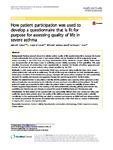How patient participation was used to develop a questionnaire that is fit for purpose for assessing quality of life in severe asthma.
| dc.contributor.author | Hyland, ME | |
| dc.contributor.author | Lanario, Joseph | |
| dc.contributor.author | Pooler, Jillian | |
| dc.contributor.author | Masoli, M | |
| dc.contributor.author | Jones, Rupert | |
| dc.date.accessioned | 2018-02-05T16:00:27Z | |
| dc.date.available | 2018-02-05T16:00:27Z | |
| dc.date.issued | 2018-01-27 | |
| dc.identifier.issn | 1477-7525 | |
| dc.identifier.issn | 1477-7525 | |
| dc.identifier.other | 24 | |
| dc.identifier.uri | http://hdl.handle.net/10026.1/10733 | |
| dc.description.abstract |
BACKGROUND: Previous research shows that existing asthma quality of life questionnaires fail to measure the burden of oral corticosteroids that can be used to treat severe asthma, and are therefore not fit for purpose for severe asthma according to the USA's Federal Drug Authority's (FDA) criteria for content validity. Patient input and documentation of that input is key to achieving content validity according to FDA guidelines. This paper describes the process of constructing a new questionnaire to measure the burden of asthma symptoms and burden of treatment in severe asthma, using criteria specified by the FDA. METHODS: A draft severe asthma questionnaire (SAQ) was constructed using qualitative input from severe asthma patients who took part in an earlier study. The aim of this study was to improve that draft questionnaire using a further group of patients. In four iterative focus groups, 16 people with severe asthma completed the draft questionnaire, discussed the wording and structure and suggested changes that were incorporated into the final version. RESULTS: The original intention to ask patients to identify whether problems were caused by asthma symptoms or side effects of medication was abandoned as the attribution of cause was found to be difficult and inconsistent. The recall period of 2 weeks was acceptable but fails to reflect the patients' desire to express the variability of severe asthma. Patients suggested improvements to the wording of the draft questionnaire, including splitting some items in two, combining two items in one, and changes to some of the words in individual items and the response scale. CONCLUSIONS: The final version of the questionnaire was substantially different from one constructed using only qualitative reports from patients about the quality of life deficits of severe asthma. Patients make a valuable contribution to the questionnaire if they are asked to comment and improve an initial draft and where patients are treated as partners in the process of questionnaire construction, rather than only as a source of information to experts who construct the questionnaire. | |
| dc.format.extent | 24-24 | |
| dc.format.medium | Electronic | |
| dc.language | en | |
| dc.language.iso | en | |
| dc.publisher | BioMed Central | |
| dc.subject | Assessment | |
| dc.subject | Content validity | |
| dc.subject | Methodology | |
| dc.subject | Patient reported outcome | |
| dc.subject | Questionnaire construction | |
| dc.subject | Severe asthma | |
| dc.title | How patient participation was used to develop a questionnaire that is fit for purpose for assessing quality of life in severe asthma. | |
| dc.type | journal-article | |
| dc.type | Journal Article | |
| plymouth.author-url | https://www.ncbi.nlm.nih.gov/pubmed/29374455 | |
| plymouth.issue | 1 | |
| plymouth.volume | 16 | |
| plymouth.publication-status | Published online | |
| plymouth.journal | Health and Quality of Life Outcomes | |
| dc.identifier.doi | 10.1186/s12955-018-0851-9 | |
| plymouth.organisational-group | /Plymouth | |
| plymouth.organisational-group | /Plymouth/Faculty of Health | |
| plymouth.organisational-group | /Plymouth/REF 2021 Researchers by UoA | |
| plymouth.organisational-group | /Plymouth/REF 2021 Researchers by UoA/UoA03 Allied Health Professions, Dentistry, Nursing and Pharmacy | |
| plymouth.organisational-group | /Plymouth/REF 2021 Researchers by UoA/UoA03 Allied Health Professions, Dentistry, Nursing and Pharmacy/UoA03 Allied Health Professions, Dentistry, Nursing and Pharmacy MANUAL | |
| plymouth.organisational-group | /Plymouth/Research Groups | |
| plymouth.organisational-group | /Plymouth/Research Groups/Centre for Brain, Cognition and Behaviour (CBCB) | |
| plymouth.organisational-group | /Plymouth/Research Groups/Centre for Brain, Cognition and Behaviour (CBCB)/Behaviour | |
| plymouth.organisational-group | /Plymouth/Research Groups/FoH - Community and Primary Care | |
| plymouth.organisational-group | /Plymouth/Research Groups/Institute of Health and Community | |
| plymouth.organisational-group | /Plymouth/Research Groups/Institute of Translational and Stratified Medicine (ITSMED) | |
| plymouth.organisational-group | /Plymouth/Research Groups/Institute of Translational and Stratified Medicine (ITSMED)/CCT&PS | |
| plymouth.organisational-group | /Plymouth/Users by role | |
| plymouth.organisational-group | /Plymouth/Users by role/Academics | |
| dc.publisher.place | England | |
| dcterms.dateAccepted | 2018-01-19 | |
| dc.identifier.eissn | 1477-7525 | |
| dc.rights.embargoperiod | Not known | |
| rioxxterms.versionofrecord | 10.1186/s12955-018-0851-9 | |
| rioxxterms.licenseref.uri | http://www.rioxx.net/licenses/all-rights-reserved | |
| rioxxterms.licenseref.startdate | 2018-01-27 | |
| rioxxterms.type | Journal Article/Review |


